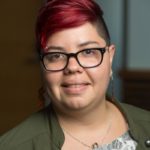 |
October 18, 2018Dr. Rosa León Zayas, Willamette UniversityDescription of the microbial community composition and metabolic potential of a depth profile in the Tonga Trench from 400m in the water column to 2m below the seafloor |
Abstract
Exploration of the deep ocean has expanded our understanding of oceanic ecosystems including continental margins and mid-ocean ridges. However, little is known about the deepest sites on Earth, oceanic trenches. In this study, sediment and water samples were collected from the Tonga Trench to a maximum depth of 9100m below sea level. These include four water column samples at depths of 400m, 3000m, 5000m and ~9100m, and sediment samples at 0, 1, and 2 meters below the seafloor (mbsf). Analysis of the sediment samples provides a new perspective of life in the deep ocean. While sediment samples are more taxonomically similar to one another other, especially the 0mbsf and 2mbsf samples, functional analysis suggests that the 9,100m and 2mbsf are much more closely related than their community composition indicates. The deep-water column and 0mbsf sediment samples share very similar metabolic profiles, and perform varied aerobic as well as anaerobic metabolisms, including degradation of organic carbon, oxidative phosphorylation, fermentation, nitrate reduction and sulfide oxidation. The water samples varied from Archaea dominated at 400m, to over 90% Bacteria at 9100m. The 400m sample displays low oxygen metabolic signatures, while the mid water samples are the most similar to each other and possess aerobic metabolic signatures including archaeal ammonia oxidation. These analyzes allow for an unprecedented look of a largely understudied section of our planet.
Speaker Biography
Rosa León Zayas is an Assistant Professor in the Department of Biology at Willamette University focusing on environmental microbiology and bioinformatics. After receiving her bachelor’s degree from the University of Puerto Rico, she studied genome analysis of ultra deep-sea single-cell microbes at the Scripps Institution of Oceanography at the University of California-San Diego and during her postdoctoral work at the University of Delaware. Her research has been supported by the National Institutes of Health and the National Science Foundation, including a C-DEBI Postdoctoral Fellowship. She has also collaborated with the University of Delaware Sea Grant College Program through a C-DEBI Education Grant (Project VIDEO: Virtual, Interactive, Dark Energy Outreach) to create a series of science videos in English and Spanish.
Recording

